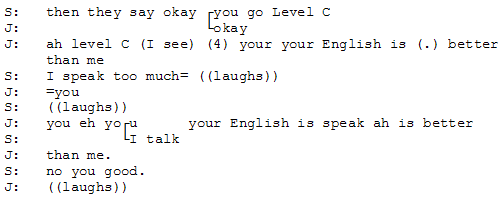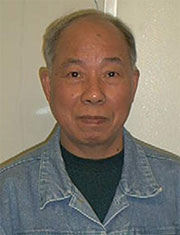Jing made modest but fairly accurate assessments of his proficiency in English in conversations with classmates and in writing to his teacher. In his first term of study, he tells a Chinese speaking classmate (Jin) that he could write fast, but could not listen and pronounce very well. Jian said that when he knew the word, he could guess the meaning easily (1-14-03, 204 [1:59:23] cam 1). This self assessment is supported by the testing data which show that he was strong in literacy but not as strong aurally/orally.
The next week, also speaking with Jin in Chinese, Jing reported that he knew little bit English in China and added that his speaking and listening were bad (1-21-03, 204 [1:56:00]).
Later in 2003 (October 21), in a task interaction with a peer, Jing again displays to a peer that he doesn't rate his English language proficiency highly (Click to View).

Early in the following year (January 13, 2004), in a break time discussion with several classmates in Chinese, the topic of being promoted to the next class level (from C to D) came up. His classmate (Ming) wondered why Jing did not go to level D because the teacher suggested that he study in level D. Jing said that in his exam he had the highest scores in writing and reading. However, he felt that he did not do well in listening and speaking. So, he preferred to retake level C.. Jing kept saying that he did not want to study in level D. He even said one teacher suggested that he study in the level D class where she was teaching but Jing concluded that he preferred to study in level C right now (1-13-04, 204, level C [1:38:50- 1:43:10] camera 5, microphone right).
And finally, one year later (January 2005) when Jing was in a level D class (the highest level of ESL in the community college's program), in a writing assignment for the teacher, he asks his teacher to allow him to remain in a level D class for one more term.
In this letter to the teacher, he again assesses his listening and speaking skills as not sufficient for even level D. He mentions "ENNL" and "ABC" (he is referring to ABE) which are 'English as a Non-native Language' (credit ESL classes) and 'Adult Basic Education', respectively, which are often the next classes that students move to after the four-level ESL courses. Students must pay regular community college tuition for ENNL and ABE classes while ESL classes are inexpensive ($45 for 9 hours of class a week for a ten-week term). His statement that he cannot afford the for-credit classes shows the financial realities for immigrant-learners struggling to become members of the English-language speaking US culture.
